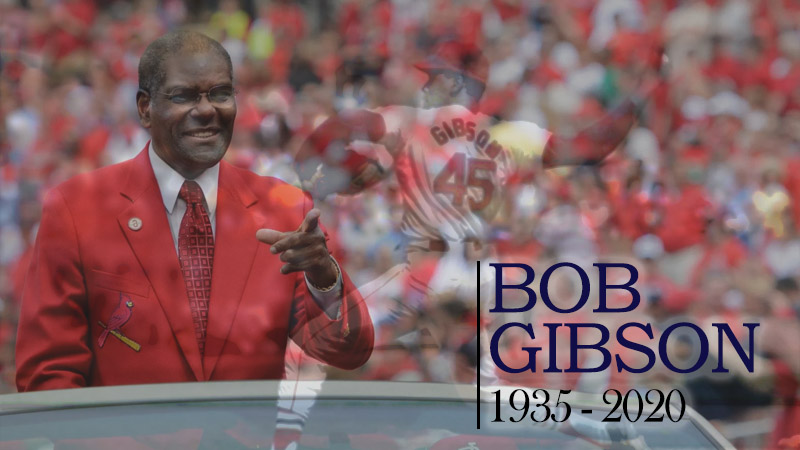By Nathan Tucker
The greatest Cardinals pitcher of them all, Bob Gibson, passed away at the age of 84 on Friday, Oct. 2. On the same day, the Cardinals were eliminated from baseball’s postseason by the San Diego Padres. Losing the game felt trivial in comparison to losing Gibson.
Gibson is the second former/lifelong Cardinal to die in the past month. His longtime teammate, Lou Brock, died at 81 on Sept. 6.
Gibson’s death came on the 52nd anniversary of what is widely considered his greatest game, a World Series record 17-strikeout performance in the 1968 series against the Detroit Tigers.
“Bob Gibson was arguably one of the best athletes and among the fiercest competitors to ever play the game of baseball,” said Cardinals chairman, Bill DeWitt Jr., in a statement. “Even during the time of his recent illness, Bob remained a strong supporter of the team and remained in contact with members of the organization and several of our players. He will be sorely missed.”
When Gibson was young, it never seemed he would be able to reach the heights of his MLB career. His father passed before his birth, and his early life was filled with medical troubles, from rickets to hay fever.
Despite this rough early start, Gibson grew into an all-around athlete by high school, and played baseball and basketball at Creighton University.
Before starting his baseball career, Gibson’s prowess on the basketball court landed him on the world famous Harlem Globetrotters. He toured with the Globetrotters for a year after college before signing an MLB contract.
Gibson would go on to have five 20-win seasons, two 19-win seasons and another with 18. His 1968 season earned him the National League’s Most Valuable Player and Cy Young awards.
He was so dominant in that season, baseball had to change. The strike zone was made smaller, and umpires policed pitchers doctoring baseballs. Most importantly, in 1969, the height of the pitcher’s mound was lowered by 33 percent, from 15 inches to 10.
(For the uninitiated, a pitcher’s mound allows the pitcher to stride downhill and add speed to a pitch.)
Despite baseball’s best efforts, Gibson won 20 games in 1969. His ERA, or earned run average, was slightly higher at two while striking out 269 hitters, one more than he had in 1968.
Gibson announced in January of 1975 that he would retire following the upcoming season. The team had a ceremony for his years of service on Sept. 1 of that year.
Two days following the ceremony cataloging his career highlights, Gibson was brought out of the bullpen against the Chicago Cubs. He allowed a pinch-hit, game-losing grand slam to Cubs bench player Pete LaCock.
Gibson retired the next batter on a groundout, and then walked off the mound for the last time.
“I had reached my absolute limit in humiliation,” Gibson said in his book “Stranger to the Game”. “I said to myself, ‘That’s it. I’m out of here.’”
He might have hung up his cleats that day, but Bob Gibson’s legacy will live for generations to come.
Featured image by Maria Martinez Nogueda





